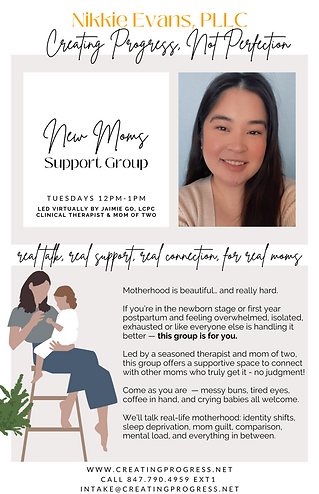Perinatal & Postpartum
Are you pregnant, transitioning into motherhood for the first time, or a mom of multiple children trying to find your groove? Are you feeling anxious, sad, tired, overwhelmed, discouraged, alone, overstimulated, or helpless? Are you experiencing "mom guilt" & wondering if you'll ever "feel like yourself" again? You are not alone! These are common feelings experienced throughout motherhood.
Let's talk about it!

It is not uncommon for a mother to feel ashamed or embarrassed about their feelings of anxiety or depression, fearing judgment or being seen as inadequate mothers. The societal pressure to appear happy and fulfilled after having a baby can contribute to this stigma. Limited social support, such as a lack of understanding or empathy from family or friends, can make it difficult for women to reach out for help. Feeling isolated and unsupported can exacerbate feelings of anxiety and discourage seeking assistance.
Perinatal mental health refers to the emotional well-being of individuals during the perinatal period, which includes pregnancy and the first year after childbirth. During the perinatal and postpartum time period, it is common for women to struggle with various mental health issues.
1. Perinatal & Postpartum Depression: This is a type of depression that occurs during pregnancy or after childbirth. Symptoms may include persistent sadness, loss of interest in activities, changes in appetite, sleep disturbances, feelings of guilt or worthlessness, and difficulty bonding with the baby.
2. Perinatal & Postpartum Anxiety: Anxiety disorders, such as generalized anxiety disorder or panic disorder, can manifest or worsen during the perinatal or postpartum period. Women may experience excessive worry, restlessness, irritability, difficulty concentrating, and physical symptoms like rapid heartbeat or shortness of breath.
3. Perinatal & Postpartum Obsessive-Compulsive Disorder (OCD): Some women may develop obsessive thoughts or engage in compulsive behaviors during pregnancy or after childbirth. These thoughts and behaviors may revolve around the baby's safety, cleanliness, or other concerns.
4. Postpartum Post-Traumatic Stress Disorder (PTSD): Women who have experienced a traumatic childbirth or have a history of trauma may develop symptoms of PTSD after giving birth. Flashbacks, nightmares, hyper-vigilance, and avoidance of triggers are common symptoms.
5. Perinatal Psychosis: Although rare, perinatal psychosis is a severe mental health condition that requires immediate medical attention. Symptoms may include hallucinations, delusions, confusion, disorganized behavior, and mood swings.
It is important to note that perinatal mental health struggles can vary in severity
and duration. They can significantly impact a woman's well-being, her ability to
care for herself and her baby, and the overall family dynamics. The good news
is that therapy can be extremely helpful in managing and treating these mental
health challenges during the perinatal and postpartum period, so that you can
getback to feeling like yourself again!
If you're struggling and in need of support, we have therapists on our team that
specialize in supporting moms!
We offer individual therapy, as well as a Mom's Support Group. This group is
currently led by Jaimie Go, MA, LCPC. Jaimie is a mom of two, and
perinatal/postpartum mental health specialist. This group provides a safe and
judgment free space to explore the joys, anxieties, and challenges related to
motherhood, while gaining a deeper understanding of yourself as a mother,
enhancing your parenting toolbox, and increasing feelings of support by building
a network of support from other moms that truly 'get it.'
Reach out to learn more!

